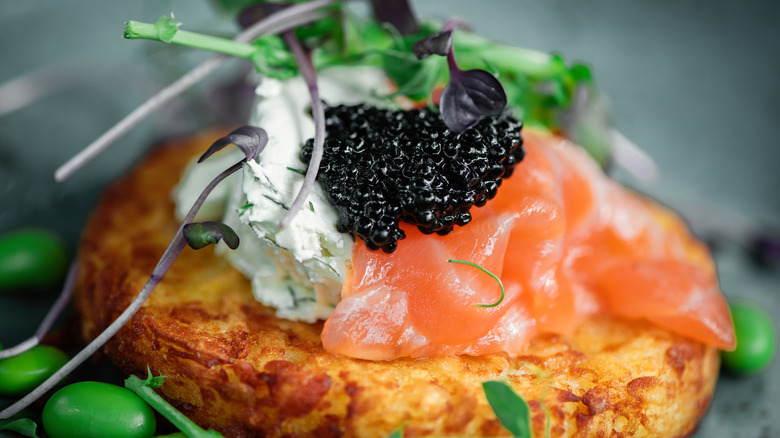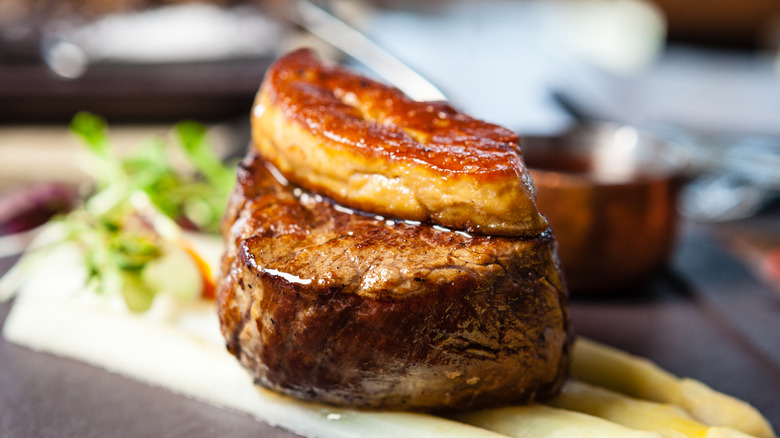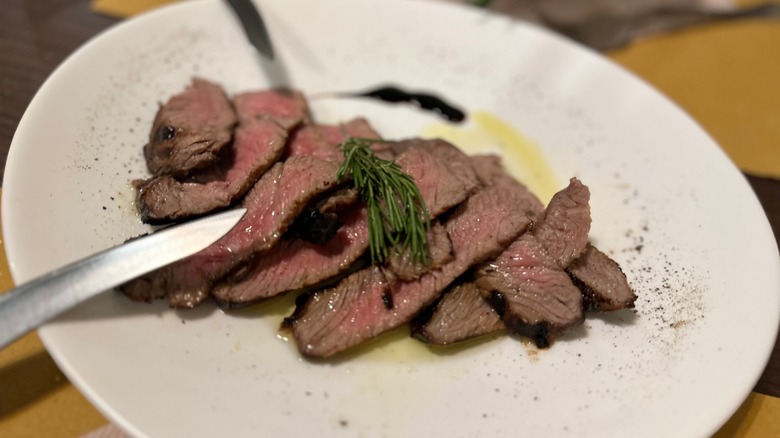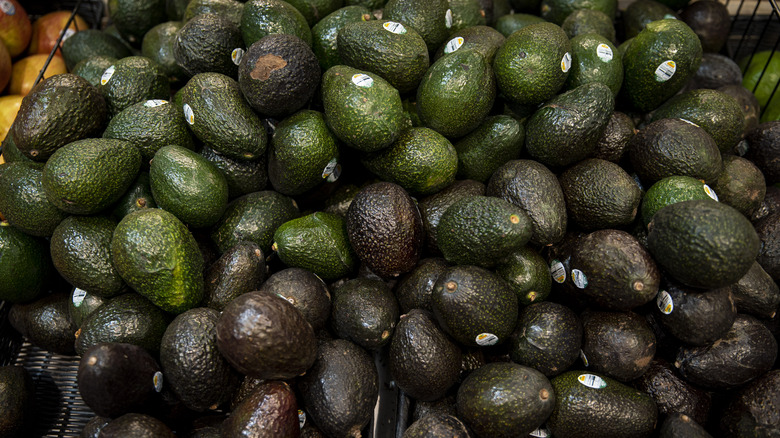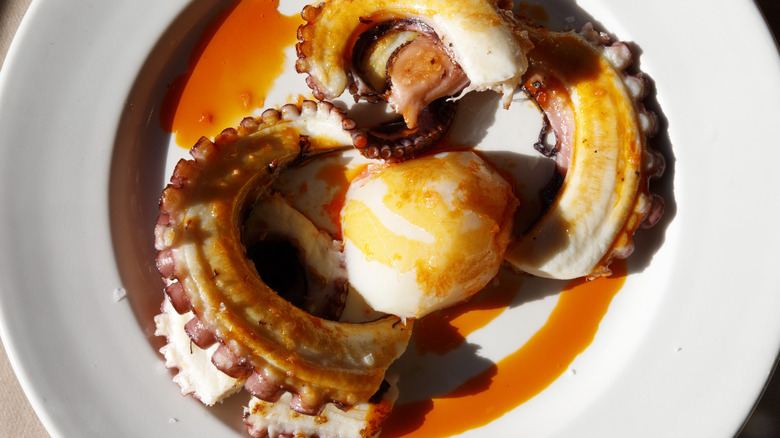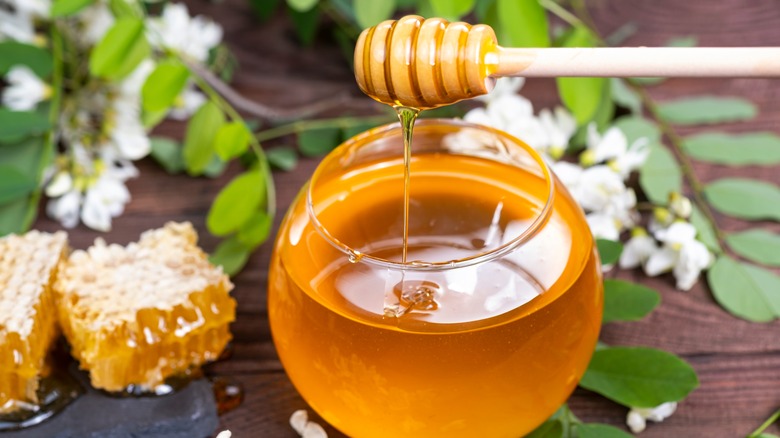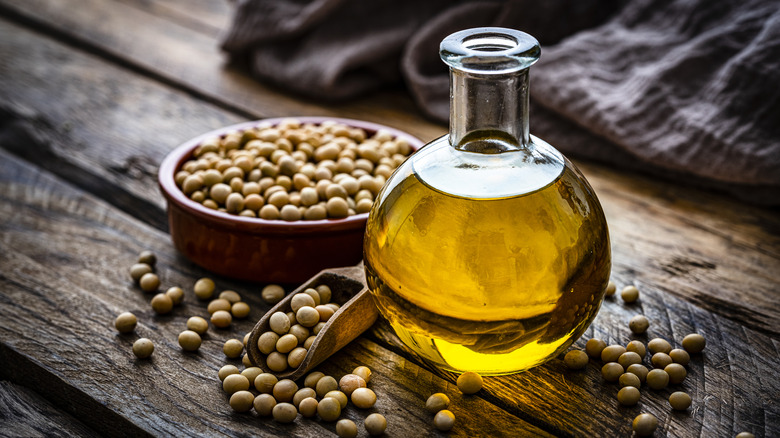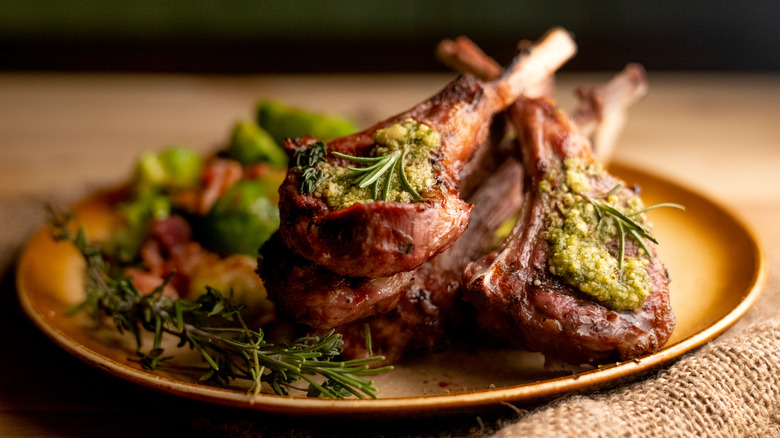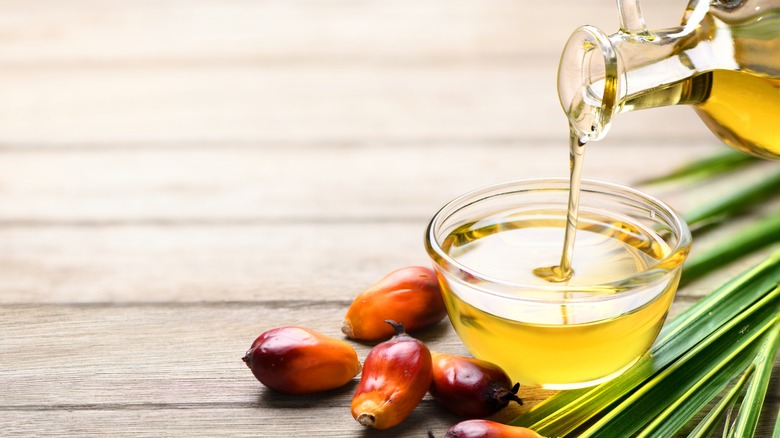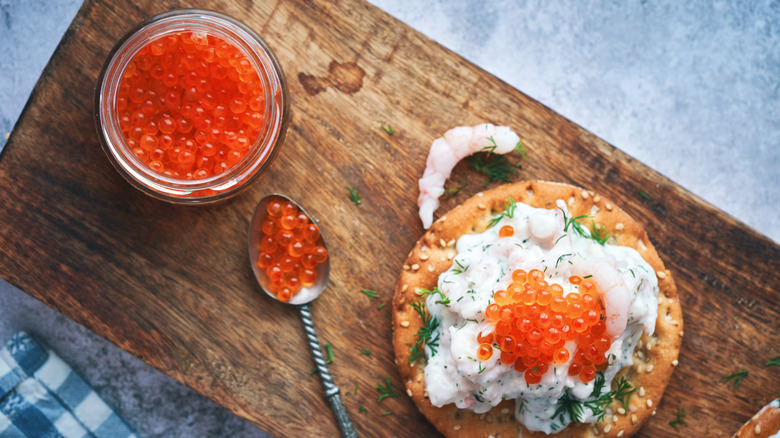The Most Controversial Foods Served On US Menus
You're ordering what? If you've ever raised a few eyebrows when placing your order at a restaurant, you may think that you have a pretty controversial palate. A well-done steak? You'll take it. Anchovies on your pizza? The more the better.
However, we're not talking pineapple on pizza or dipping your fries in mayo. While, yes, those foods and food combos are certainly polarizing, instead, we're taking a look at the truly controversial foods served throughout the United States. These are foods that some love and will defend in an instant, while others claim they're, in some cases, downright unethical. The complaints range from environmental concerns to animal welfare issues and health scares. Some of these foods are pretty well known for being controversial, while others aren't as much — and some could even be lurking in your pantry right now. Here's what you need to know about whether or not you need to look out for these foods on the menu the next time you go out to eat.
Foie gras
Foie gras — fatty duck or goose liver — can be traced all the way back to the ancient Egyptians. It is considered a delicacy and a staple in fine dining. However, if just about any foodie were asked to name a "most controversial" food, they'd likely point to this ingredient, as both its supporters and its opponents are highly vocal, and it's all due to the methods farmers must use in order to raise birds with such highly fatty livers. Producers force-feed the birds using a funnel — the birds gorging themselves to the extreme before processing.
Those who love foie gras are quick to argue that, due to the birds' physiology, the process is completely painless, no matter how it looks, so long as the birds are raised in an ethical environment and not in a factory farm setting. Despite this, many countries have still banned foie gras production, mostly in Europe, citing cruelty to animals. A couple of locations within the United States have likewise attempted to ban foie gras sales, but those bans have been overturned.
Veal
Veal has been around for centuries, but really reached peak popularity in the United States in the 1940s. For the uninitiated, veal is meat sourced from calves, often the male calves born at dairy farms, where the female calves grow up to support the dairy industry, but where the male calves require a different use. Farmers feed the calves a liquid-heavy diet for about six months before processing, and the result is a milder, more tender cut of beef. Many who oppose veal say that the production process is inherently cruel, as historically, calves were confined for their entire lives in such a way that they could not build any muscle mass.
Today, raising veal in confinement is illegal in the European Union. In 2007, the American Veal Association likewise decided that, by 2017, they would require all veal farmers to house their calves in "group housing," which supposedly allows for greater movement and enrichment. Additionally, supporters are quick to point out that calves today do not subsist on a completely liquid diet, but are also fed grain.
Avocados
No, avocados aren't controversial because they're the one thing preventing millennials from buying their first homes (and, besides, research has already found that avocado toast, even if you order it multiple times per week, is definitely not what's standing in the way of homeownership for anyone). Instead, avocados — which are undeniably tasty and touted as a heart-healthy source of fat and other nutrients — are controversial due to how they're raised.
An ingredient growing rapidly in popularity over the last 10 years, avocados are big business in Mexico, as one of the most profitable crops in the country. In fact, Mexican farmers found avocados so profitable that some of them chose to illegally chop down forests in order to make more room for the avocados, causing a serious deforestation problem. Think you'll buy California-grown avocados instead then, for less controversy? Those who claim avocados just aren't environmentally sustainable overall note that all avocados come with a large carbon footprint and require massive amounts of water to grow. Still, the California Avocado Commission claims it's doing what it can to make the industry more sustainable by encouraging farming practices such as erosion control, water conservation, and carbon sequestration.
MSG
Monosodium glutamate, or as most of us know it, MSG, was patented by a chemistry professor in 1909 after the professor identified a nonessential amino acid in kelp, combined it with salt, and promoted it as a seasoning that could bring out the umami flavors in food. While the product is "generally recognized as safe" by the U.S. Food and Drug Administration, MSG has carried a stigma for decades, particularly after a medical journal published a letter from a physician claiming that MSG — and particularly MSG in Chinese food — made him ill. Since then, many individuals have claimed that MSG makes them sick, reporting symptoms like headaches, numbness, chest pain, nausea, and more.
That said, the general consensus in the medical community is that there's no scientifically proven reason why MSG would cause any illnesses. More recently, consumer perceptions of MSG are changing. An Atlantic article proposed MSG as a healthier alternative to salt following the World Health Organization's warning that too much salt could needlessly kill 7 million people by 2030, and you can now find MSG used in award-winning restaurants.
Octopus
It seems like octopuses are frequently in the news and scattered across social media feeds, all because someone was lucky enough to film one of the sea creatures behaving amusingly and intelligently. Octopuses can solve problems, use tools, keep secrets, recognize and communicate with humans, and more. This high level of intelligence has prompted some to ask if eating octopus is really ethical.
A Spectator article posed the argument that, if many people don't want to eat animals that we normally think of as pets, like dogs or horses, because we think of those animals as high-functioning, feeling, expressive creatures with their own personalities, why would an octopus be any different if it displays the same traits? Beyond this, the World Economic Forum says farming octopuses is bad for the environment. Despite these concerns, though, octopus remains a popular option on many menus, considered a delicacy to some, prompting a worldwide octopus market that produces approximately 350,000 tons of octopus per year.
Honey
"Save the bees" has been a battle cry for many an environmental warrior who can recognize the major importance bees play in our world's environment, and how bees directly impact agriculture and, as a result, our food systems. If you want to save the bees, then, it would make sense to eat honey (and this is what humans have thought for a while). After all, if demand for honey grew, it would encourage more money-minded corporations and organizations to protect the root source of that money, aka the bees.
However, some argue that eating honey can actually contribute to bee extinction and animal rights violations. A Fast Company article reported that industrial honey production causes bees to die prematurely, can be stressful to bees, and can ultimately reduce bee reproduction. Still, beekeepers argue back that any responsible beekeeper will not harm their bees or the hives during the harvesting process. So long as you're buying local honey, they say you can rest easy knowing that you're not harming the planet with your honey consumption.
Soy
First cultivated millennia ago, introduced into North America in the 1700s, and mostly used stateside as a feed crop until the 20th century, the soybean gets a lot of love from some camps and a lot of hate from others. Some say soy helps prevent cancer, others say it causes cancer. Some say it helps with hormones, some say it causes thyroid issues. However, whatever your feelings on the food, there's no arguing that soy is just about everywhere, in all sorts of products. You're going to encounter it at some point (unlike some other controversial foods, like foie gras, that you might not come across on too many menus or at the average grocery store), so what's the truth?
Physicians seem to say that the answer is going to differ according to the person, unfortunately. Soy may perform differently in different people according to individuals' naturally occurring hormone levels. That said, an article from the University of Pittsburgh Medical Center calls soy "healthy for most."
Lamb
Many diners don't prefer to eat veal because, well, let's face it — thinking about eating a cute baby animal is just tougher than thinking about eating an adult animal. Some people also do not eat lamb for the same reason. Similarly, those who are anti-lamb chops cite animal cruelty reasons, pointing to tail docking, premature separation from mother sheep, and lambs' high levels of intelligence. An environmental factor is also presented, with sheep considered the second-least environmentally friendly animal to farm, second only to cows.
Those who love a good lamb roast, though, are quick with their own arguments in favor of the meat. An Independent article called lamb the most ethical meat to eat, pointing to the free-roaming lifestyle many sheep enjoy, and also noted that practices such as tail docking are necessary to prevent later health problems. Some lamb fans, likewise, say lamb is healthier than beef, containing greater levels of omega-3 fat.
Diet soda
If you're craving the sugary goodness and caffeine of a soda, but are watching your calorie or sugar intake, you might reach for a diet soda without a second thought. However, some have decried the artificial sweeteners in diet soda as potentially worse for you than the sugar you'll find in a regular soda — and the latest news hardly makes pinpointing the lesser of two evils any easier.
As Reuters reported in June 2023, the World Health Organization decided that aspartame warranted a label as a possible carcinogen. After the announcement, though, the U.S. Federal Drug Administration released a statement that the new label didn't literally mean aspartame is linked to cancer. Furthermore, the FDA said they did not agree with the label and said that the label was based on insufficient studies. Other experts, like those from Houston Methodist, likewise responded to the new label, noting that any claims that aspartame causes "serious harm" are unfounded.
Palm oil
Like the controversial soy, palm oil can be found in a huge range of food products. However, many people say that palm oil is best avoided when possible, as palm oil production is extremely bad for the environment, contributing to deforestation and animal extinction (most notably, palm oil production impacts orangutans).
However, palm oil comes with its benefits too, even from an environmental perspective. Oil palm trees — which are native to Africa and were brought to Southeast Asian plantations by European colonizers in the 19th century, with a big boost in production in the mid-20th century that we're still feeling today — are a highly productive plant in terms of how much oil you can get from a minimal amount of crops. Additionally, the tree requires less fertilizer and pesticides than some other, popular crops. The proposed solution (and one embraced by industries that currently use palm oil): Stop burning rainforests in order to grow oil palm trees. Unfortunately, that solution is easier said than done.
Caviar
A luxurious delicacy that you'll find on a fair number of fine dining menus, caviar is intrinsically tied to wealth and the finer things in life, and has been for much of history. Aristotle sang the praises of caviar in Ancient Greece. In the Middle Ages, the Brits proclaimed the sturgeon (from which caviar is sourced) to be the royal fish, and caviar continued to remain popular with royalty throughout Europe and Russia for centuries. (In other words, if you want to feel fancy or impress someone, serve caviar at your next party.)
However, some argue that it's time we let this royally endorsed food trend die out. Not only has overfishing for caviar caused the sturgeon population to decline catastrophically, but the way caviar is harvested in the wild can be undeniably cruel; in some cases, the fish eggs are cut from the mothers' stomachs and then the fish are thrown into the water to die. While farmed caviar is more ethical, it's not entirely so, with the harvesting process still injuring the mother fish, though not fatally.
